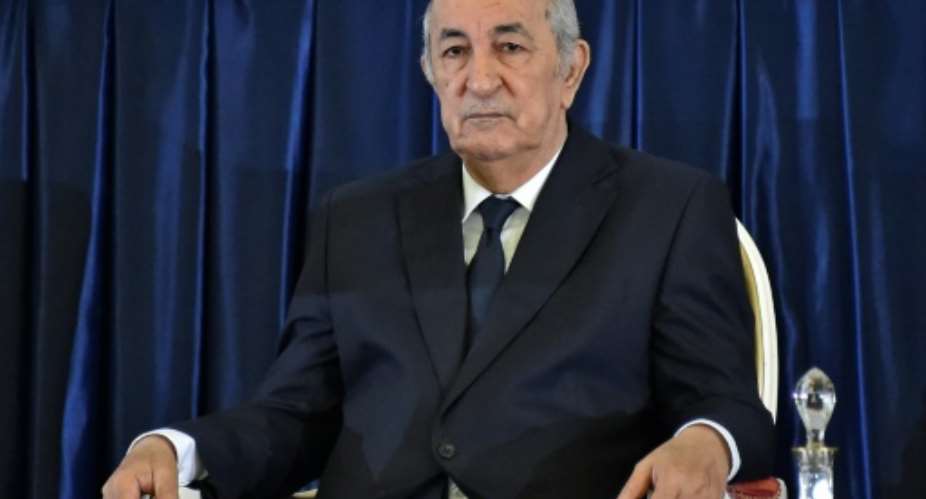A month after Algerian President Abdelmadjid Tebboune was hospitalised in Germany and tested positive for coronavirus, uncertainty about his health is fuelling questions about the country's leadership.
Tebboune, who is 75 and a heavy smoker, was admitted to hospital in Germany on October 28 to undergo "in-depth medical examinations", according to the presidency.
He was transferred from a facility in the Algerian capital days after going into self-isolation following reports of novel coronavirus cases among his aides.
The last tweet from his personal Twitter account dates to October 24, and the Algerian presidency has issued a series of statements on the president's health.
A day before he was transferred abroad, the presidency said Tebboune's "state of health does not raise any concern" but a week later it announced that he had contracted the Covid-19 illness.
On November 8, it said Tebboune was "in the process of completing his treatment" and that his health was "constantly improving". A week later it said he had finished treatment and was undergoing "post-protocol medical tests".
Since then, there has been deafening silence, except for a report last week by the official APS news agency saying that German Chancellor Angela Merkel had sent Tebboune a letter of good wishes.
The fragmented information and lack of any photographic evidence of Tebboune's state of health are fuelling speculation at a time when Algeria is experiencing a resurge of its coronavirus outbreak.
For many Algerians, the developments have recalled the power vacuum that followed the hospitalisation of former president Abdelaziz Bouteflika.
The veteran leader -- who stepped down in April 2019 weeks into mass protests against his bid for a fifth term -- had suffered a debilitating stroke in early 2013 and stayed in hospital abroad for nearly three months.
Article 102
Tebboune's "long absence due to illness, combined with a 'protocol' of information double-speak, indicates that the president really is sick," Algerian political scientist Mohamed Hennad told AFP.
"Hennad said that "if his prolonged absence poses a problem, it is not because of the illness itself, but because the authorities... complicate things unnecessarily."
Some are starting question whether Article 102 of Algeria's basic law should be applied in order to avoid a constitutional crisis.
Hennad said that under the article, a power vacuum was viewed in two stages: "temporary impairment (of the president), for a maximum duration of 45 days, then resignation" beyond that duration.
Were that to occur, Salah Goudjil, the 89-year-old interim senate president who fought in Algeria's 1954 to 1962 war of independence against France, would serve as acting president, pending the election of a new head of state.
Tebboune's illness meant he was out of the country for a November 1 referendum on a revised constitution seen as aiming to bury a mass protest movement and boost the president, elected on a record low turnout last December.
Algeria has officially recorded more than 80,000 novel coronavirus cases and more than 2,000 deaths.





 NDC demands complete overhaul of security protocols at EC to safeguard electoral...
NDC demands complete overhaul of security protocols at EC to safeguard electoral...
 Ghana reaches interim deal with international bondholders — Finance Ministry
Ghana reaches interim deal with international bondholders — Finance Ministry
 Mahama to form joint army-police anti-robbery squads to safeguard 24-hour econom...
Mahama to form joint army-police anti-robbery squads to safeguard 24-hour econom...
 Another man jailed eight months over shrinking penis
Another man jailed eight months over shrinking penis
 Ghana to adjust external bond deal to meet IMF debt sustainability goals — Finan...
Ghana to adjust external bond deal to meet IMF debt sustainability goals — Finan...
 IMF negotiations: We've not failed to reach an agreement with bondholders; we’ve...
IMF negotiations: We've not failed to reach an agreement with bondholders; we’ve...
 EC begins recruitment of temporary electoral officials, closes on April 29
EC begins recruitment of temporary electoral officials, closes on April 29
 NPP lost the 2024 elections in 2022 due to inflation and cedi depreciation — Mar...
NPP lost the 2024 elections in 2022 due to inflation and cedi depreciation — Mar...
 Your good heart towards Ghana has changed; don’t behave like Saul - Owusu Bempah...
Your good heart towards Ghana has changed; don’t behave like Saul - Owusu Bempah...
 Wa West: NDC organizes symposium for Vieri Ward Women
Wa West: NDC organizes symposium for Vieri Ward Women
